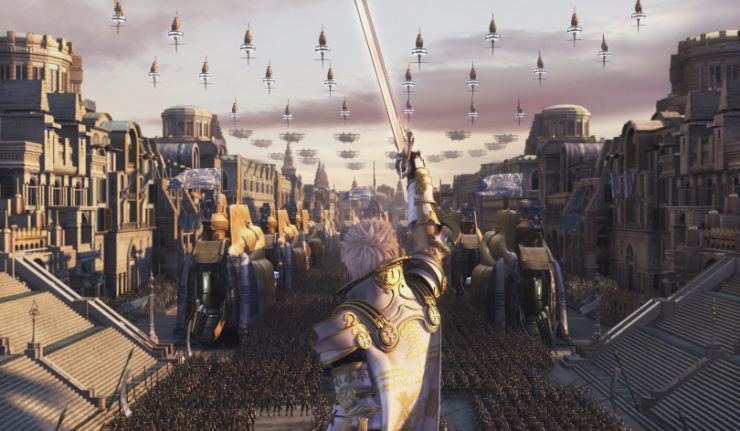Although I would very much like to barrel forward with my assertion that Final Fantasy XII is the best Final Fantasy ever made, I am obliged to begin with caveats.
I have not played any of the games in the franchise prior to Final Fantasy X, unless you count the Final Fantasy VII spin-off, Dirge of Cerberus—which you should not. This means that I cannot definitively say that XII is the ultimate iteration of the franchise.
Furthermore, I have not played any of the Massive Multiplayer Online (MMO) Final Fantasies. I have three good reasons for this. The first is that my old internet connectivity situation didn’t allow for the extravagance of playing online. The second is that my bank balance didn’t allow for the extravagance of monthly subscription fees. The third is that playing MMOs involve interacting with strangers on the internet for fun. Hard pass.
My last caveat is that people are entitled to have differing opinions and criteria by which they judge the merits of a game.
Released in 2006, Final Fantasy XII received widespread critical acclaim and sold over 6.1 million copies of the original Playstation 2 edition. In many ways, it marked a departure from previous entries in Square Enix’s flagship series. Turn-based combat was supplanted by a more dynamic pseudo-realtime combat system, where players could either manually determine the actions of their party members during a battle, or set up ‘gambits’—a sequenced list of situation-specific behaviours that characters would undertake automatically. It was also a game steeped with epic fantasy political intrigue—the personal stories of the characters woven into a complex landscape of imperialism, diplomacy and statecraft.
And this, while impressing critics, served to alienate much of the longstanding Final Fantasy fanbase. In seeking to revitalize a 32-year-old franchise, developers faced a difficult choice. On the one hand, experimenting with bolder mechanics offered the potential to draw in new audiences. On the other, diverging substantially from the tropes native to the genre risked disappointing traditionalists.
Was it worth the risk? The release of Final Fantasy XIII saw Square Enix moving away from the innovations and tone of XII, so by the developers’ estimations: perhaps not.
It did, however, result in the creation of a singular game—my all-time favourite game— and although I’m certain that Square Enix will never produce another in quite the same vein, Final Fantasy XII was remastered for modern consoles in 2017. Which means that you can, and absolutely should, play it now.
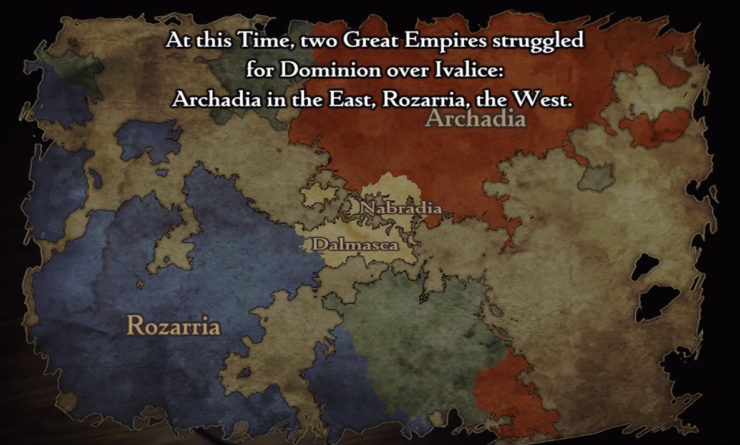
The narrative is set in the secondary world of Ivalice. Two huge nations, Rozarria in the west and Archadia in the east, prepare for a bloody war. A relatively narrow stretch of land divides the great imperial powers. Here, trapped and vastly outnumbered, lie the sovereign countries of Dalmasca and Nabradia.
Archadia, seeking to press south towards their foe, crushes the Nabradian forces in the opening cutscenes of the game. Dalmasca, next in the path of Archadian conquest, is forced to sign a treaty of surrender and accept subjugation and occupation. However, moments after signing the agreement, the king of Dalmasca is betrayed and murdered. The heir to the throne commits suicide (or does she?) and Archadia assumes absolute control over Dalmasca.
Two years pass. Rabanastre, capital of Dalmasca, is a changed city and slowly adjusting to existence under Archadian imperial rule. For some, the wealthy and the canny, the yoke of occupation sits comfortably enough. For many, life has grown considerably more difficult. The destruction of Nabradia led to the deaths of a swath of the adult population of Dalmasca, and the city teems with orphans and broken families. A second subterranean city—Lowtown—lies below the gleaming streets of Rabanastre, where those less fortunate eke out an existence in dim, winding corridors.
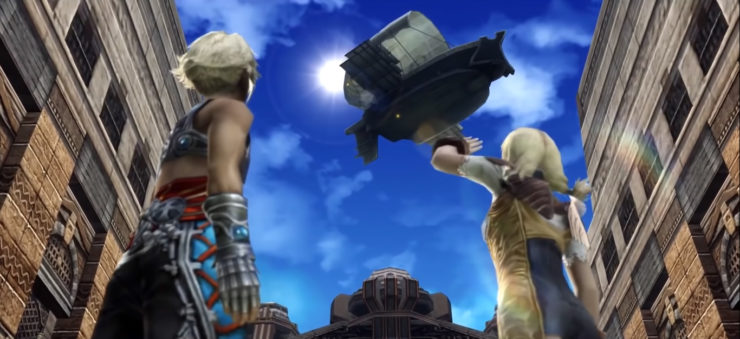
It is here where we meet 17-year-old Vaan, an ambitious street urchin who divides his time between hunting rats in the sewers, cutting the purses of occupying Archadians, and avoiding the errands of his some-time caretaker, Migelo. Following the arrival of Rabanastre’s new Archadian consul, Vayne Solidor, Vaan gets it into his head that he’s going to rob the city’s royal palace. This goes surprisingly well… until an attack on the palace by the Dalmascan Resistance interrupts his escape.
Based on the above, you would probably receive the impression that Vaan is the protagonist of the game. And for a while, he is. You could argue that he serves as the main character up until an encounter with Marquis Ondore on the sky city of Bhujerba. After that, as conflicts escalate and the cast expands, the question of who is the central character of Final Fantasy XII grows hazy. And this, in my opinion, is great.
It’s a reasonably well-known amongst the Final Fantasy XII fanbase that Basch fon Ronsenburg was originally scripted as protagonist of the story. Basch, a grizzled war veteran of thirty-three, stands accused of murdering the late king of Dalmasca. Subsequently arrested by the Archadians, he is one of the few people in Dalmasca more despised than the imperial conquerors.
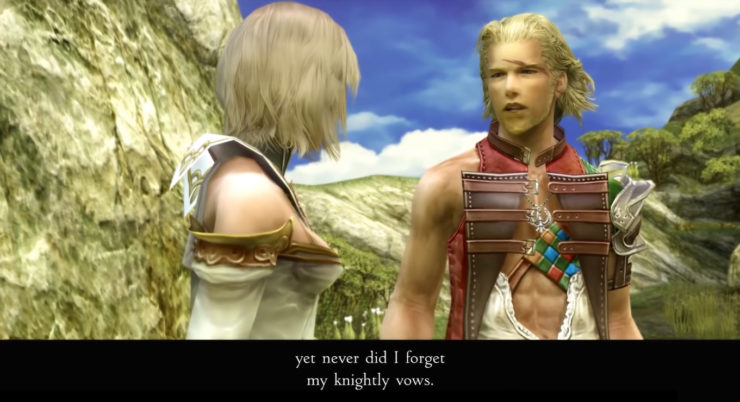
Honestly, I wasn’t much taken by him either, as he mopes about being honourable and loyal and long-suffering. I mean, he’s okay. But he is also the person you kick out of the main party first.
Neither Vaan nor Basch wear the mantle of protagonist well; Vaan is ultimately too naïve to serve as the focal point of any kind of gravitas, and Basch is perhaps too dour and reticent to suit the story’s tone. While Basch ultimately acts with greater influence than his developer-selected usurper, his growth as a character is negligible. Apparent regicide aside, he begins the game an honourable man, and ends it the same way. That he holds to his principles is admirable, but his role is well-worn, and I’m glad that the Square Enix team chose to shift the narrative weight off his shoulders.
Who then, might better serve as lead?
It is certainly not Penelo or Fran, who are both placed firmly in ‘supporting cast’ roles.
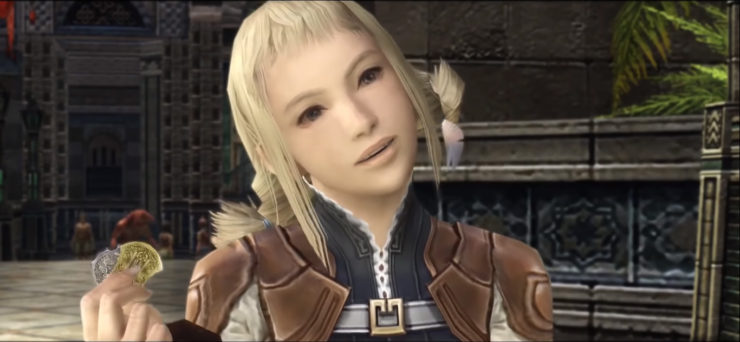
Penelo is Vaan’s childhood friend—cheerful, responsible and surprisingly resilient, but mostly present to establish jokes, ask helpful questions for the player’s benefit, and serve as a foil to her reckless companion. Although I like Penelo’s design and find her quite charming, I recognize that she could easily be removed from the narrative without changing any of the action of the latter half of the game.
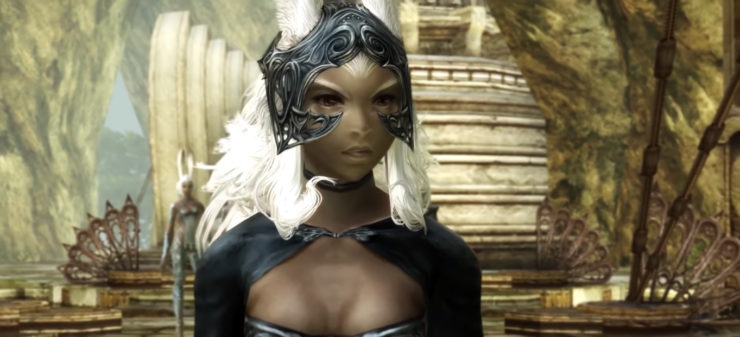
Fran is far better developed as a character. A viera sky pirate with a particular sensitivity to the magic forces of Ivalice, her story is enigmatic and tragic. As an excommunicate of a deeply spiritual community, she is ostracized by her own people and widely misunderstood by humans. Intelligent, knowledgeable and of unknown age, Fran’s story unwinds in hints and allusions. Is she lonely? Does she regret leaving home? Is what she gained commensurate to what she has lost? And do these questions even matter, considering that the consequences of her actions are irrevocable by the time the narrative begins?
I would happily have played Final Fantasy XII—Fran’s Adventures in Sky Pirating, but sadly her story thread is not fully entwined with the rest of the action of the game. She stands a little aside; the clash of empires only affects her so far as it affects her friends. That is not to say she doesn’t care, or isn’t invested in the fate of Dalmasca, but that she has already lost her home and thus stands to lose the least now. Although she plays a more prominent role than Penelo, she is not the driver of the plot.
I have more to say about Fran, but will first return to the question of protagonist primacy. Two party members remain, Balthier and Ashe.
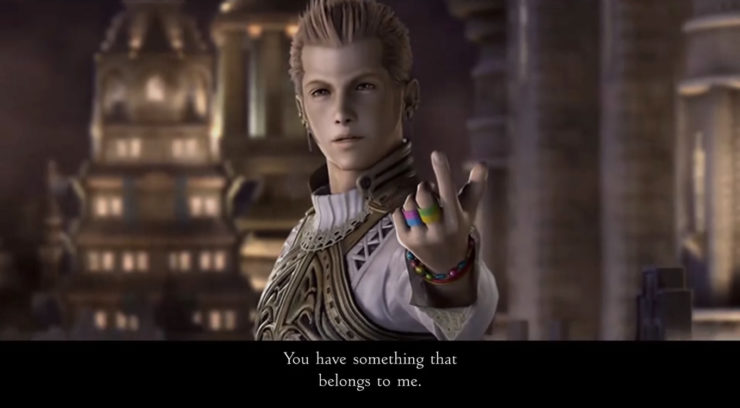
Balthier, on a semi-regular basis over the duration of the game, declares himself the leading man. I thought this was hilarious and somewhat slyly metatextual given the developers’ dithering between Vaan and Basch. Balthier is Fran’s sky pirate partner with a Mysterious Past, Dad Issues, and no compunction about thieving his way to glory. He provides most of the game’s humour, but also much of the game’s heart, and often plays a key role in progressing the plot. Is he the leading man? There’s definitely a case for it. But, without giving too much away, during the climax of the story Fran remarks: “I’d say you’re more of a supporting role.” Balthier, in response: “Fran, please.”
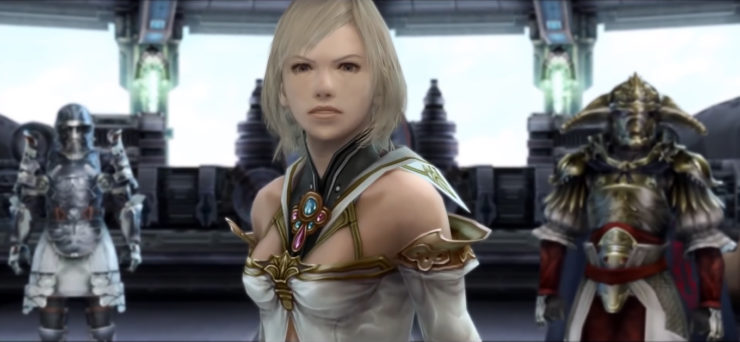
That leaves Ashe, the not-so-dead heir to the Dalmascan throne. After Marquis Ondore declares that she committed suicide, Ashe goes into hiding and helps to form a resistance movement to reclaim her stolen kingdom. She is vengeful, determined and proud, and initially very unimpressed when forced to seek aid from people who were in the process of robbing her palace. However she is resolved to do whatever it takes to expel Archadian forces from Dalmasca, and thus forms an uneasy alliance with street rats, sky pirates and one disgraced captain who supposedly murdered her father.
Ashe’s narrative arc is concerned with tension between the injustice wrought against her, and the notion that power-at-any-cost will perpetuate existing cycles of violence and domination. The princess believes that she has a divine right to punish her foes, or at least that she should have the raw power at her disposal to do so. Any means will justify her ends.
The game, however, is at pains to complicate this idea. Ashe’s ancestor was a Dynast King, a person appointed by the god-like Occuria of Ivalice to “set the course of history straight”. The Occuria figure heavily in the game, but their manipulative influence only grows evident in later acts. Ashe, it becomes apparent, would be their next preferred Chosen One, their new Dynast Queen. They can give her the power she seeks.
The antagonist of the game, Vayne Solidor, would also be a Dynast King, but his express goal is to free mankind of the Occuria’s meddling influence, to “set the reins of history back in the hands of mankind”. Vayne, like Ashe, will do anything to advance his cause. Like Ashe, he seeks the power of the divine to rebuild the world according to his vision of justice. Like Ashe, his goal is not ignoble. However, it is perhaps no coincidence that he is named “Vayne”, with his grandiose ideals of self-determinism. Vanity is the same vice that Ashe risks falling prey to.
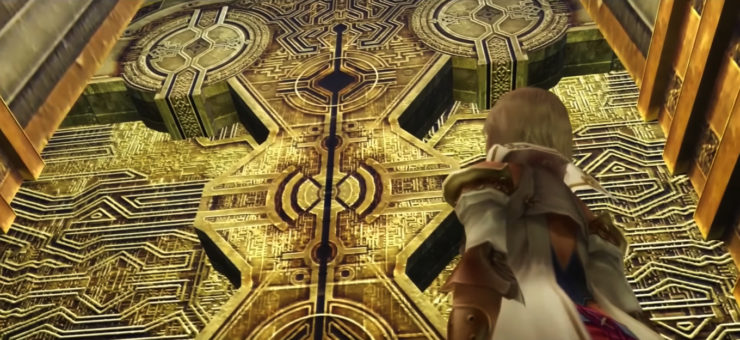
Ashe’s choices over the course of the story determine the fate of Ivalice. She has the most to lose, the most to gain, and the conflict has cost her more than any of the other characters—her throne, husband, father, and identity. Over the course of the story, Ashe’s attitudes shift as her character develops. She learns to let go of her past, and to forge new relationships rather than trying to single-handedly bring down the Archadian Empire. Vaan might have been designated the role, but in so far as the game has a protagonist, I would argue it is actually Ashe.
And yet Final Fantasy XII is not a story about individual glory, or a lone hero standing against the forces of evil. Before the final confrontation that pits the player against Vayne—the game’s singular representative of individualism— Ashe asks the party whether they think she will be strong enough to prevail in the fight. To which Vaan responds: “Who said anything about strong? You’ll make it. You’ve got good friends.”
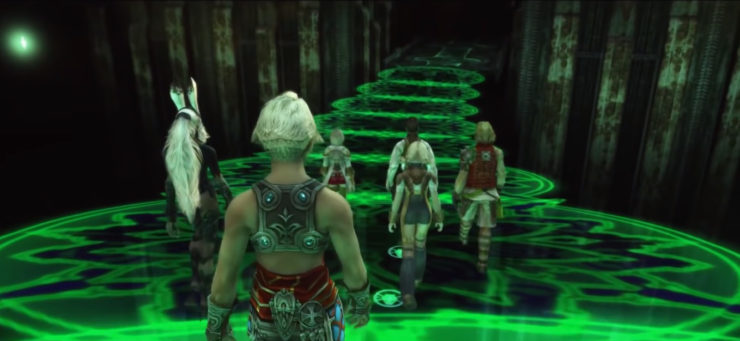
This is, in many ways, the thematic heart of the game. The notion of collaboration and community triumphing over individual strength may not be new or profound, but it is sweetly and subtly handled here. As no character truly dominates as protagonist, each is afforded the space for their own struggles and triumphs. Even Penelo, unchanging and unassuming as she might be, is granted a small moment in the spotlight – she narrates the closing cutscenes and fills in the details of the denouement.
In contrast to the epic scale of Ivalice and the clashes of empires, the emphasis on friendship and reconciliation grants the story a warmth and a coziness that renders the scope of the story meaningful. The player cares for the fate of Dalmasca because they care for the found family of misfits that fight to protect it.
Final Fantasy XII requires patience, and it does occasionally stumble along the way. I have mentioned that some players struggled to invest in the amount of politicking integral to the plot, and that others were frustrated by the gameplay mechanics. While I feel the former is an irresolvable matter of personal taste, I’ll admit that the midgame narrative structure does have a certain repetitiveness in terms of what it requires the player to do. The party spends a lot of time searching for magical rocks, or swords to cut those magical rocks, or larger magical rocks that in turn require larger cutting swords.
With regards to the gameplay mechanics, and the gambit system specifically, there were complaints that the game could effectively play itself—that sufficiently complex strings of commands allow the player to sit back and let her programming do the work. This was not my experience. I found that gambits merely take the micromanagement out of encounters with less powerful enemies; for me, it vastly reduces the sense of drudgery I associate with random enemy encounters. There is also the option to entirely ignore the gambit system, should the player prefer.
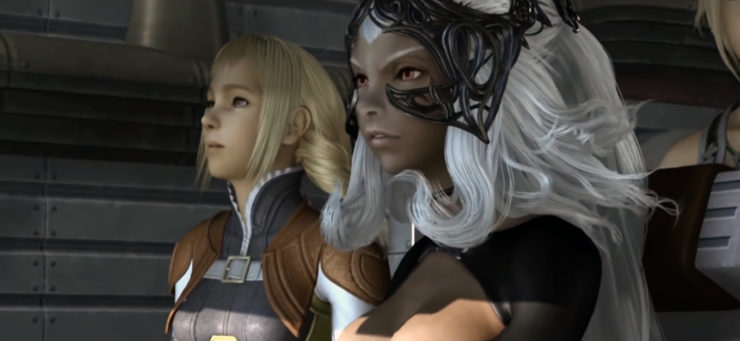
However a specific issue I take with Final Fantasy XII is female character costume design. Fran and Ashe’s outfits specifically. Ashe spends most of the game in a red miniskirt that could easily be mistaken for a belt. Fran has it worse, however, and wears what’s best described as armoured lingerie. With stiletto heels.
This looks absolutely ludicrous when she’s wandering around snowdrifts in the Paramina Rift, but might have been justifiable if Fran ever owned or even used her sexuality. I’m not sure she does; if anything, she seems oblivious to her clothing. As an engineer and a pirate, her appearance feels at odds with her personality; you have the strong sense that she did not dress herself. And when the camera casually pans over her ass during cutscenes of dry exposition, the way she is treated feels crass and exploitative.
It’s also awkward when someone walks into the room while you are playing the game, and lo, there is a six-foot, mostly-naked dominatrix with bunny ears on the screen.
But in all other respects, FF12’s aesthetics feel bold, fresh and intricate. Beyond the cast, the setting of the story has its own character and deep history; a history which can be explored or ignored at the player’s discretion. As the story winds across Ivalice, each new locale introduces further layers of meaning to the world; the player traverses the Giza Plains where nomadic people infuse crystals with sunlight, the sky city of Bhujerba hovering amidst the clouds, the mist-shrouded Feywood, the haunted Henne Mines, the rusted oil rigs of the Ogir-Yensa Sandsea. There are ruins and tombs galore, and the architecture of each is suggestive of different ages, of mythic conflicts and long-lost peoples. Who build the Sochen cave palace below the feet of Archades? Who used to live in the ancient city of Giruvegan? What happened to them?
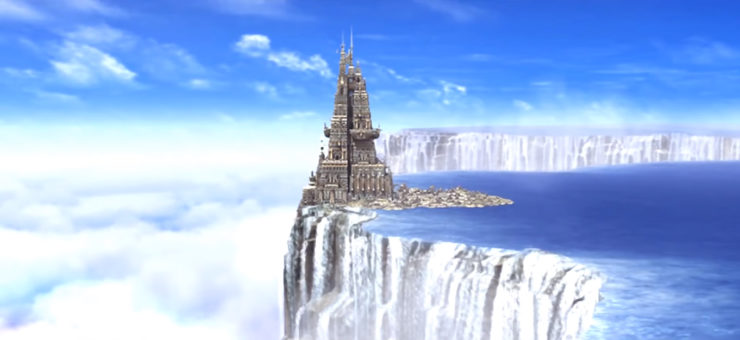
And there is so much to do, a myriad of side quests and hunts. There is a surprisingly challenging fishing minigame, and an entire region of the map (the Necrohol of Nabudis) that has no direct bearing on the main storyline. In every corner of the map, new secrets lie in wait; they beckon, they whisper with promise of a new adventure, more to see if you are prepared, or if you are reckless. Final Fantasy XII exudes a generosity of imagination. It knows that you can’t see everything, can’t do everything, can’t learn everything about the world of Ivalice, but it invites you to try.
It’s also unexpectedly funny; a wry vein of humour runs through the game. Final Fantasy XII takes itself seriously—it must, as it depicts the losses of war and the wounds of occupation. But it never sinks into nihilism, and its frequent moments of levity balance the heavier thematic material. It’s hopeful, always. The characters know they face impossible odds, but they strive to rise above them.
Final Fantasy XIII, the next installment in the franchise, loses this lightness. It’s a beautiful game visually, but playing it is like watching a catastrophe unfold, watching the end of the world—matters only ever spiral downwards, with no real hope of recovery. Other people might find that compelling, but I found it difficult to connect with the doomed cast, and wasn’t engaged enough to make complete sense of the plot. While XII was political, it was also rooted in human responses. I knew what the villain wanted, I knew what the heroes were trying to achieve. In XIII, I was never even sure who the antagonist was, let alone how the characters’ efforts served to thwart them.
It was pretty, but it had none of the sense of wonder or scale of XII. This might also have been due to its claustrophobic linearity. XIII moves from one set location to the next, but seldom gives any room for individual exploration. The world is about to end and you need to fix it now. No, you can’t go fishing.
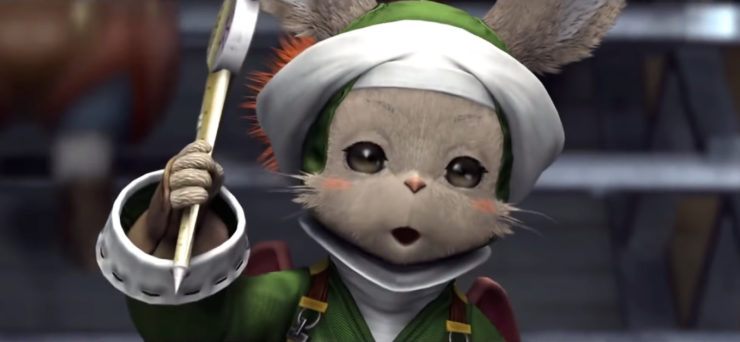
In contrast, Final Fantasy X gives you plenty of space to roam and loads of diversions to chase. It’s one of the more popular entries in the franchise. I can see why, but it failed to win me over. Perhaps it’s because I played XII first, and went in with the expectation that X would more closely resemble it. After the subtlety XII, the delicacy of the character interactions, X felt overblown and obvious. Maybe the infamous ‘laugh scene’ killed it for me. Maybe I was just too terrible at blitzball.
That being said, I’m probably an outlier. Final Fantasy XII was a divisive entry into the series, and it is unlikely that audiences will ever see another like it. A Nintendo DS spin-off, Revenant Wings, was released in 2007. Another sequel, codenamed Fortress, was in development by Grin, but it was cancelled fairly early in development due to the studio’s closure. Judging by the leaked material, I’m personally glad it never materialized. The proposed second chapter would have followed Basch (nope), featured a darker tone (“gritty” chocobos), and taken some relationships in unexpected directions (romantic feelings between Basch and Ashe? Ew.) According to research done by Gamespot writer Alexa Ray Corriea, many of the people involved in the project were unfamiliar with Final Fantasy XII, and relied on Youtube and Wikipedia for research.
Buy the Book
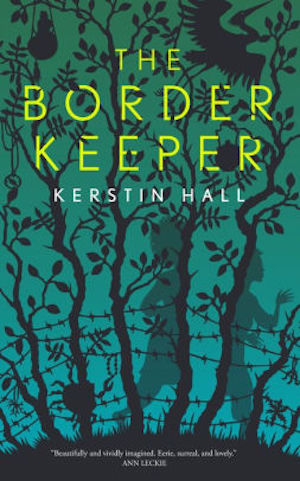

The Border Keeper
With the recent release of the remastered version of Final Fantasy XII, as well as Square Enix’s choice to remake Final Fantasy VII from the ground up, I still hold out a faint hope that players might one day return to Ivalice. A mainline sequel that travels to Rozarria and beyond, preferably in the company of Fran and Balthier, would see me camping outside gaming retailers on the morning of the release day. My younger sister informs me that she would be camping right beside me. I trust that this means she would fork up half the cost price.
A part of why the game is so special to me is that we played it together. Played it, and then replayed it. She was far better at the puzzles and the fishing, I had a knack for the Quickenings and hunting down obscure treasure chests. Final Fantasy XII offered gifts we had seldom encountered in other games. Intelligent geopolitical drama, with little in the way of black and white morality. Multiple complex and occasionally badass female characters, who were allowed to take the spotlight. A world that always felt larger than it should, the borders of the map mutable and expanding.
But even if our common dream of a sequel never comes to fruition, Final Fantasy XII will endure as classic of the genre. Jump on an airship and explore. Something more valuable might lie just over the horizon.
Kerstin Hall is a writer and editor based in Cape Town, South Africa. She completed her undergraduate studies in journalism at Rhodes University and, as a Mandela Rhodes Scholar, continued with a Masters degree at the University of Cape Town. Her short fiction has appeared in Strange Horizons, and she is a first reader for Beneath Ceaseless Skies. She also enjoys photography and is inspired by the landscapes of South Africa and Namibia. The Border Keeper publishes July 16th with Tor.com Publishing.










